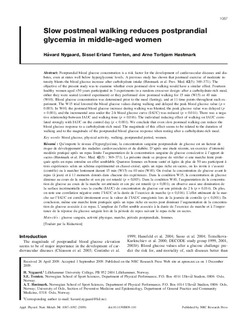| dc.contributor.author | Nygaard, Håvard | |
| dc.contributor.author | Tomten, Sissel Erland | |
| dc.contributor.author | Høstmark, Arne Torbjørn | |
| dc.date.accessioned | 2010-05-12T08:00:39Z | |
| dc.date.available | 2010-05-12T08:00:39Z | |
| dc.date.issued | 2009 | |
| dc.identifier | Seksjon for fysisk prestasjonsevne / Department of Physical Performance | |
| dc.identifier.citation | Applied Physiology, Nutrition and Metabolism. 2009, 34(6), 1087-1092 | en_US |
| dc.identifier.issn | 1715-5312 | |
| dc.identifier.uri | http://hdl.handle.net/11250/170553 | |
| dc.description | © NRC Research Press | en_US |
| dc.description.abstract | Postprandial blood glucose concentration is a risk factor for the development of cardiovascular diseases and diabetes, even at states well below hyperglycemic levels. A previous study has shown that postmeal exercise of moderate intensity blunts the blood glucose increase after carbohydrate intake (Høstmark et al. Prev. Med. 42(5): 369?371). The objective of the present study was to examine whether even postmeal slow walking would have a similar effect. Fourteen healthy women aged >50 years participated in 3 experiments in a random crossover design: after a carbohydrate-rich meal, either they were seated (control experiment) or they performed slow postmeal walking for 15 min (W15) or 40 min (W40). Blood glucose concentration was determined prior to the meal (fasting), and at 11 time points throughout each experiment. The W15 trial lowered the blood glucose values during walking and delayed the peak blood glucose value (p = 0.003). In W40, the postmeal blood glucose increase during walking was blunted, the peak glucose value was delayed (p = 0.001), and the incremental area under the 2-h blood glucose curve (IAUC) was reduced (p = 0.014). There was a negative relationship between IAUC and walking time (p = 0.016). The individual reducing effect of walking on IAUC correlated strongly with IAUC on the control day (p < 0.001). We conclude that even slow postmeal walking can reduce the blood glucose response to a carbohydrate-rich meal. The magnitude of this effect seems to be related to the duration of walking and to the magnitude of the postprandial blood glucose response when resting after a carbohydrate-rich meal. | en_US |
| dc.language.iso | eng | en_US |
| dc.publisher | National Research Council Canada | en_US |
| dc.subject | blood glucose | en_US |
| dc.subject | physical activity | en_US |
| dc.subject | walking | en_US |
| dc.subject | postprandial period | en_US |
| dc.subject | women | en_US |
| dc.title | Slow postmeal walking reduces postprandial glycemia in middle-aged women | en_US |
| dc.type | Journal article | en_US |
| dc.type | Peer reviewed | en_US |
| dc.subject.nsi | VDP::Medical disciplines: 700::Clinical medical disciplines: 750 | en_US |
| dc.subject.nsi | VDP::Medical disciplines: 700::Health sciences: 800 | en_US |
| dc.subject.nsi | VDP::Medical disciplines: 700::Sports medicine: 850 | en_US |
| dc.source.pagenumber | 1087-1092 | |
